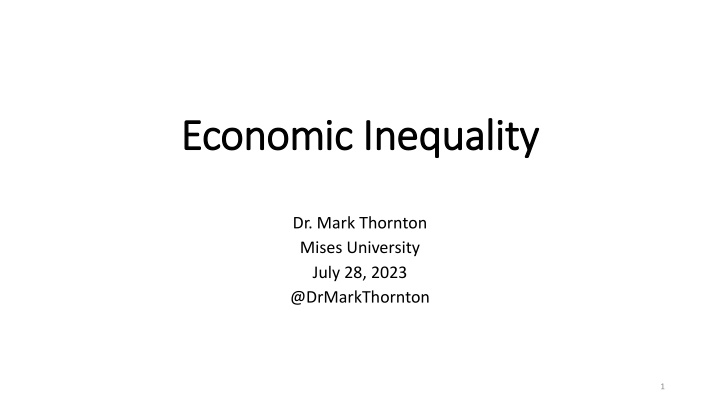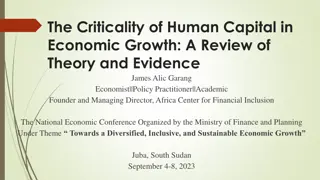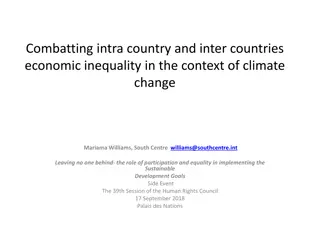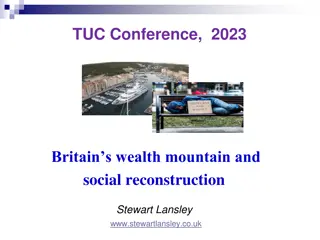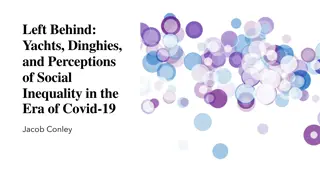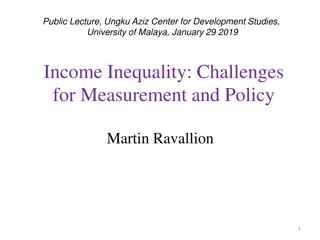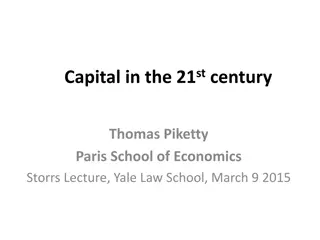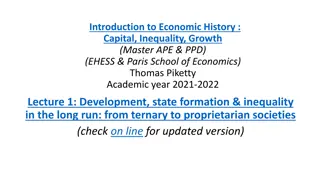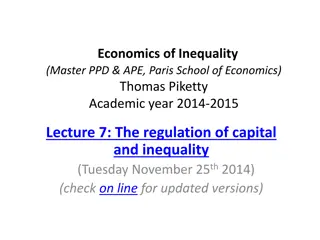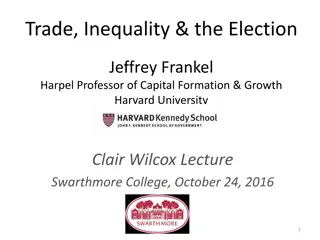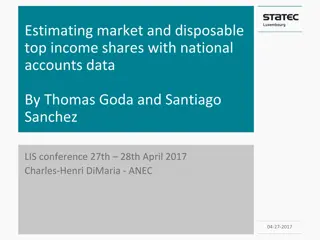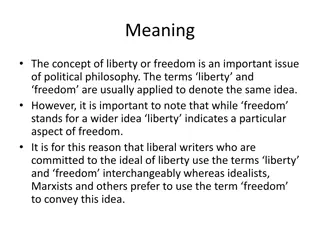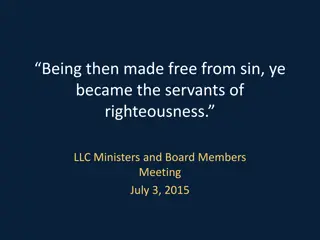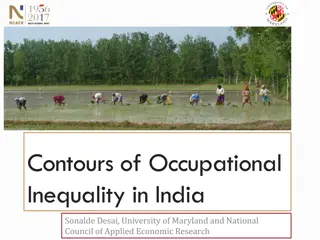Economic Inequality and Human Freedom: A Perspective by Dr. Mark Thornton
Dr. Mark Thornton discusses economic inequality, individual uniqueness, and the importance of freedom in a society. He explores the various aspects of human inequality, challenges common notions of equality in markets, and emphasizes the role of reality in economic dynamics.
Download Presentation

Please find below an Image/Link to download the presentation.
The content on the website is provided AS IS for your information and personal use only. It may not be sold, licensed, or shared on other websites without obtaining consent from the author.If you encounter any issues during the download, it is possible that the publisher has removed the file from their server.
You are allowed to download the files provided on this website for personal or commercial use, subject to the condition that they are used lawfully. All files are the property of their respective owners.
The content on the website is provided AS IS for your information and personal use only. It may not be sold, licensed, or shared on other websites without obtaining consent from the author.
E N D
Presentation Transcript
Economic Inequality Economic Inequality Dr. Mark Thornton Mises University July 28, 2023 @DrMarkThornton 1
Minor Issues Podcast Minor Issues Podcast @DrMarkThornton @DrMarkThornton 2
Introduction Introduction 1. Austrians love economic inequality 2. Many types of equality and inequality 3. Socialists use coercion for economic inequality 4. That voice is filled with lies, distortions, and the unseen 5. Reality is your guide 3
Inequality as Reality If men were like ants, there would be no interest in human freedom. If individual men, like ants, were uniform, interchangeable, devoid of specific personality traits of their own, then who would care whether they were free or not? Who, indeed, would care if they lived or died? The glory of the human race is the uniqueness of each individual, the fact that every person, though similar in many ways to others, possesses a completely individuated personality of his own. It is the fact of each person's uniqueness the fact that no two people can be wholly interchangeable that makes each and every man irreplaceable and that makes us care whether he lives or dies, whether he is happy or oppressed. And, finally, it is the fact that these unique personalities need freedom for their full development that constitutes one of the major arguments for a free society. MNR 4
Aspects of Human Inequality Physical and Biological differences (e.g., sex and sex preference) Tastes and preferences (e.g., good and services) IQ, Interests, Talents, education, training, experiences Tastes for labor vs. leisure (i.e., energetic vs. lazy) Time preferences (i.e., now vs. later thinking, e.g., savers) Risk taking preferences (e.g., entrepreneurs vs. wage labor) All of this can be distorted by government, but not fixed Reality is the perplexing brew of all these factors Law of Comparative Advantage: We all have one! Income distribution is the reality on the market 5
Dubious Types of Equality in Markets Innate equality (at birth) obviously wrong Equality by birth obviously wrong Equality of opportunity obviously wrong Equality of result obviously wrong Attempts fail Attempts harm Attempts backfire Attempts can destroy civilization Economics recognizes reality and demonstrates its benefits for all! 6
Systems of Inequality Natural Law some equality & justice (basic) Rule of Law some equality & justice (legal) Theocracy caste system & injustice Monarchy caste system & injustice Democracy caste system & injustice Dictatorship caste system & injustice Socialism & Progressivism caste system & injustice Capitalism or Anarcho-Capitalism and Law some equality /justice 7
Human Development Requirements Reality: the diversity of Nature, which does not repeat itself but creates the universe in infinite, inexhaustible variety. ... von Mises Freedom despotism of all sorts stymies humanity Development >> Subsistence (Industrial Revolution) Division, specialization, and comparative advantage=productivity Productivity Wages > Subsistence; Wages C = savings Economic Growth Savers-> Capitalists-> Entrepreneurs=>capitalism Capitalists paid Interest to contribute savings/capital (stocks and bonds) Entrepreneurs borrow and pay labor now for later revenues Entrepreneurs bear uncertainty $ Profit and Loss 8
Every Role is Harder than it looks The global division of labor is amazing in terms of standards of living, population, life expectancy, equality of results and achievement. We all serve everyone else to our mutual benefit. Capitalist families deprive themselves to acquire capital. Most consume all or most of what they produce. The return after risk of repayment, bankruptcy, fluctuation, inflation, and taxes is very low. Entrepreneurs bear uncertainty of the market (consumers). We see the extreme success stories, but most fail even with good products. Bubbles make it look easy, but most of them fail too!! Labor has to work more and invest in their education, training, and experience to Wages (college, apprenticeship, minor leagues) @ Opp. Cost + saving for higher incomes 9
Incomes in the Free Market Nature => subsistence & Malthusian Law of Population applies Labor: Labor time Landlord: Resources Capitalist: Savings Entrepreneur Risk/Uncertainty Profit/Loss After the fact No profits until the others are paid and buyers are satisfied Profit expectations can turn to real losses if buyers are not satisfied Wages Rents Interest Paid now Paid now Paid over time Profits are the smallest component, but the driving force (wages, rents, interest) 10
Socialist Proposition: Efficiency and Equity Mises and reality showed socialism was inefficient at best Socialist (Heilbroner and Piketty) Equity and Ecology Equity Redistribute wealth and income Welfare and Progressive Income Tax, etc. Ecology Global warming, climate change Regulating everything to change the weather Involves technocratic control without real science or justice (includes Covidia) 11
What Biases Income Distribution Government: Politicians and Bureaucrats gain, taxpayer and citizens lose Government Monopolies: Rich monopolies gain, while the barred and consumers lose Central Bank: Rich politicos gain, while labor and low incomes lose Summary: Political Rich Class gains, productive and taxpayers lose 12
Government Statistics Biases the Debate Does not count the total number of Welfare dollars given away* Does not count the total number of Tax dollars taken* Does not consider all the business failures and bankruptcies (where capitalists and entrepreneurs suffer) Does not consider all the foregone economic potential: Rent seekers earn abnormally high incomes and competitors are stymied. Welfare recipients are almost all capable to earning more income. Taxpayers are widely discouraged from maximizing their free market incomes. Incomes and the economic pie could be much larger (PPF)*** 13
The Myth of American Inequality: How Government Biases Policy Debate Gramm, Ekelund, and Early, Forthcoming 2022 Looked at government statistics from 1967 to 2017 Recalculated these statistics to include: All forms of welfare benefits (income redistribution); many missing from stats. All forms of taxation (income redistribution); many missing from the stats. This greatly increased the consumable income of low-income quintile households. This greatly reduced the consumable income from high-income quintiles. This turned all the reported stats on their heads. Things are better or the same, not worse over the last 50 years! 14
Official Poverty: 1947-2017 US Poverty Rate 35% 10-15 2-4% 1947 1965 2017 16
The Equality The Equality Depopulation Connection Depopulation Connection Disasters Create Equality Black Death: Labor gained versus Landowners and Capitalists Post WWII America: WWI and WWII Spanish Flu Great Depression Disasters depopulate (labor wages increase) and land and capital are relatively abundant increases economic equality 17
Takeaways You have been misled by Piketty et al, the media, the government Inequality (of all sorts) is a good thing in the free market and people have more equality of various sorts in a market society (paradox) Economic equality is a disastrous government policy that leads to economic ruin for all, including the poor and workers. Government monopolies (rent seeking) protectionism for the wealthy. 18
Thank You! @DrMarkThornton https://mises.org/library/minor-issues 19
References Murray Rothbard, Freedom, Inequality, Primitivism, and the Division of Labor, Rothbard, 1970. Murray Rothbard, Egalitarianism as a Revolt Against Nature (and other essays) Murray Rothbard, Egalitarianism and the Elites, Review of Austrian Economics, 1995. Joseph Salerno, "Ludwig von Mises as Social Rationalist, Review of Austrian Economics 4 (1990): 26 54. Ludwig von Mises, Economic Calculation in the Socialist Commonwealth 1990 edition, plus Salerno, "Postscript," Gramm, Ekelund, Early, The Myth of American Inequality: How Government Biases Policy Debate, forthcoming. 20
